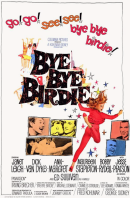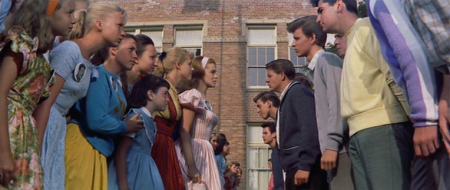 The most prominent of these, both at the time and as far as integration into the show goes, is Bye Bye Birdie. The titular Birdie is not at all a young woman, but an Elvis-esque rock singer with tight pants and a shrieking teenage fanbase. The latter open the film, first in the form of the famous Ann-Margret song, and then via a march on Washington, DC to stop the government from drafting Conrad Birdie into the military, with signs proclaiming the army to be mean and offers to “spare him” and take one of them instead. The singer has developed such a following that the girls, who claim to be “blue” when he’s not near and who’re convinced that his absence will mean “no more sunshine”, have incorporated him into a version of the Pledge of Allegiance (with his name placed before that of their country, naturally).
The most prominent of these, both at the time and as far as integration into the show goes, is Bye Bye Birdie. The titular Birdie is not at all a young woman, but an Elvis-esque rock singer with tight pants and a shrieking teenage fanbase. The latter open the film, first in the form of the famous Ann-Margret song, and then via a march on Washington, DC to stop the government from drafting Conrad Birdie into the military, with signs proclaiming the army to be mean and offers to “spare him” and take one of them instead. The singer has developed such a following that the girls, who claim to be “blue” when he’s not near and who’re convinced that his absence will mean “no more sunshine”, have incorporated him into a version of the Pledge of Allegiance (with his name placed before that of their country, naturally).
The adults in the film, or at least the men, are quite perplexed by this devotion, a reaction, I imagine, not uncommon at the time regarding the actual Elvis. A news report summarising Birdie’s “meteoric rise” consists almost entirely of close-ups of his body and girls’ worshiping reactions. In an early scene, an impromptu performance leaves an entire town square riddled with the bodies of fainted ladies both young and old. The males, particularly the girls’ potential boyfriends, are not amused: they “don’t hate anyone as much as” him. It’s a timeless dynamic, just substitute Birdie for, I suppose, Justin Bieber or One Direction.

Conrad Birdie the musician doesn’t really deserve either the adoration or the hatred. He’s not a human being, but a force of nature, with no characterisation to speak of. I wouldn’t have been surprised if he’d been made a villain, striking a facade of appealing to every girl with innocently inane lyrics, but secretly interested in exploiting them sexually. A few scenes suggest as much, but the film never commits to that. Birdie doesn’t have enough personality to be a bad guy. While it’s clear that the creators of both the movie and the original musical were intent on ridiculing the Elvis “type”, their real interests lie elsewhere.
The main plot of the film doesn’t concern any attempts by Birdie to escape the draft (in fact, it’s barely mentioned again), but rather a scheme to get a particular song charting by having Birdie perform it on the popular Ed Sullivan Show, accompanied by a symbolic kiss given to one random member of his fan club. That member is Kim, played by Ann-Margret, who is properly introduced to us (not counting the first scene) when she calls her best friend to gush about the fact that she’s finally “going steady” with a boy from her small town. Kim is an innocent even when she’s pretending to be a grown-up. She doesn’t seem to get any of the innuendo present in the going-steady musical number, she sings another song herself about finally being a woman while obliviously dressing like a boy, and her idea of teenage rebellion is calling her parents by their first names (which doesn’t last very long) and assuming that she can stay out until 10 o’clock.
—Put on a spoilerface…—
With Birdie’s big entrance, him dressed in a ridiculously tight sparkly-golden motorcycle suit, that sweetness starts to unravel a little bit, but it’s more because of her boyfriend’s unattractive jealousy than any intimation that she’s falling for the bad boy rock star with the gyrating hips. (I suspect that my interpretation here parts ways with what the filmmakers intended, given how Birdie is eventually dispatched towards the end: Kim’s boyfriend punches him in the face, instantly breaking the spell of faux-manliness and causing Birdie’s teenage fans to drop him like a potato with a glass jaw. It’s a comeuppance that Birdie hasn’t really earned, narratively. There are hints that his arrival in the small town is supposed to be seen as the start of the corruption of the town’s youth, but their big song in that regard, “A lot of livin’ to do”, is more a fairly harmless expression of frustration about the stifling early 60s than the anthem of a dangerous hedonistic lifestyle. Plus, I don’t know what this dance is supposed to be, but it doesn’t exactly ooze sex and it’s certainly not rock’n’roll.) The only moment in which Kim comes close to being anything other than wholesome is the reprise of the opening song, which contrasts her early naivety in trying to act sexy with a more experienced, confident, openly ironic attitude. It’s a development that isn’t really earned other than by Kim’s decision to get over her infatuation with Birdie and “settle down” with her boyfriend. A boyfriend who proves his worth by punching Birdie in the face, which is apparently a romantic gesture and not grounds for charges of assault.

Settling down is also the theme of the other major plot in the film. The whole “One Last Kiss” scheme originates with the sorta-fiancée (Janet Leigh, ostensibly the lead actress) of a struggling songwriter (Dick Van Dyke), who’d really rather be a chemist but can’t assert himself against his overbearing mother’s wishes. Temporary break-ups of Kim and her boyfriend, and Leigh and Van Dyke’s characters, are paralleled and resolved. A fairly silly subplot about magical speed pills developed by the chemist unfortunately turns out to be the solution to getting the song on the air. Research tells me that the character isn’t a wunderkind chemist in the original musical, but someone who really wants to be an English teacher, which doesn’t just make a lot more sense logically and is more realistic, but also puts a scene in context in which the fiancée tries to make Van Dyke’s character jealous by going out with an actual teacher (who really wants to go to New York and into show business).
Overall, Bye Bye Birdie is enjoyable enough, but the many nice songs and good acting are done a disservice by a plot that commits to little when it comes to giving its young protagonists meaningful character arcs and commits to too much silliness when it comes to the adults.
